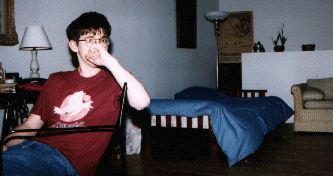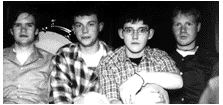|

Growing
Up in an Alt Rock World
At 18, Bright Eyes' Conor
Oberst has already seen the ups and downs of the alt rock world.
What's next for this indie Wunderkind?
story by tim mcmahan
| |
|
|
Want more Bright
Eyes? Check out these other Lazy-i Interviews with Conor
Oberst:
| |
|
So
who is Bright Eyes, the namesake of the Omaha band whose new album,
"Letting Off the Happiness" is No. 105 on the CMJ music
charts?
"Well, I'm the only constant member of
the thing," said Conor Oberst, the band's songwriter/guitarist/vocalist/mastermind
from the rather lived-in living room of his mid-town apartment,
shared with four roommates. It's your typical college party house,
with mismatched, well-worn, second-hand furniture placed haphazardly
along the oak floors, boxes strewn here and there, the scene of
recent houseparties, ad hoc rock concerts and never-ending band
practicies (somewhere, someone practiced drums, and the echo of
a snare and high-hat punctuate our conversation).
Oberst looks anything but a rock star, curled
up on one end of a couch, sucking on a soda straw. And he doesn't
sound like one, either. He is the boy wonder with the nerdy glasses
and unkempt hair, who would look right at home behind a computer
monitor or with his nose firmly planted between the pages of a big,
thick book.
At age 18, he is practically an indie-music
veteran, releasing his first tape of songs the summer before he
started 8th grade at St. Pius grade school. "I actually
started playing when I was 10 or 11 and writing when I was 12 or
13," he says. "My dad, who plays guitar and piano and
was in cover bands, along with my older brother, Matt, taught me
guitar and stuff. I started writing acoustic songs and playing by
myself in 7th grade."
One night at the now defunct Kilgore's, a hole-in-the-wall
performance space that is now the Shelterbelt Theater, Ted Stevens
of Lullaby for the Working Class, asked Oberst to play the last
song of an evening's worth of folk music. Bill Hoover, now of the
Dark Town House Band, was on hand and asked Oberst to come back
and play a couple weeks later. "I had to write enough songs
to play a whole set," Oberst says, "and that was how I
got started."
Six months after Water, (which, he says,
was probably the first release on what would become Saddle Creek
Records) Oberst released a second tape of solo material, Here's
to Special Treatment, this time on Sing Eunuchs! Records. What's
he think of his freshman and sophomore efforts? "At the time,
I was generally pleased at what I was doing," he says, "Now,
I look back and they're laughable."
|
|
|
Shortly
after his two solo recordings, Oberst began playing with Tim Kasher,
who played with Cursive, and Matt Bowen, who plays bass for The
Faint. The three formed Commander Venus the summer before Oberst's
freshman year at Creighton Prep. "I didn't know how to play
with a band at all," he says. "I couldn't keep in time
with the drums." Robb Nansel, who runs Saddle Creek Records,
also joined the band on guitar.
They recorded two albums, Do You Feel at
Home? on Saddle Creek and The Uneventful Vacation, on
Grass Records, which became Wind Up Records, that ultimately licensed
the CD to Thick Records. The story of how the second album was recorded,
and the band's dealings with Wind Up management, is one of carefree
excess. Uneventful…, released in July 1997, cost $15,000
to record, a staggering sum for an indie album.
"It became this joke of how much money
we could pilfer from this record label," Oberst said. "They
bought us a van and sent us on these tours. They had all this money
and didn't know how to run a record label. The new management all
came from a major label and knew nothing about underground music.
It was a zoo, they didn't know what was going on and didn't have
the know-how to make something happen."
Despite the money thrown at the project, Oberst
considers The Uneventful Vacation -- a loud, sometimes brash
alt-rock album that still manages to encompass Oberst's awkward
but powerful personal music style -- to be "somewhat of a failure
musically. We wanted to do stuff we weren't prepared to do because
I'm not a very good guitar player. That's always been my biggest
problem."
The project also was rushed, having to be recorded
during summer vacation. Furthermore, the band wasn't happy with
their producer. Despite all that, the record received college airplay,
as well as positive critical nods, including a Scratch magazine
review that said, "If Commander Venus is any indication of
what's to come from the second generation of indie rock, then the
future looks bright indeed." The hot rumor was that Commander
Venus could be "the next big thing" out of Omaha. The
rumor was wrong.
"First, Matt quit. He was frustrated; he
didn't want to play drums. Then Tim had to make a decision, because
Cursive was really picking up at the time and he was their main
guy. We knew it would come to this point where we'd both be touring
at the same time, so he bowed out."
The band continued for another nine months with
Todd Baechle on bass and Ben Armstrong on drums. They toured the
East Coast, but Oberst began to feel penned in by the band. "It
lost its luster and I got fed up with the big 'emo music' craze.
We got tagged as an emo band right off the bat."
For those who haven't been keeping score of
the latest indie music crazes, "emo" was a popular catch-name
for loud, sad, melodic music, played by bands such as Sunny Day
Real Estate, Seam and just about any band on the Crank Records label.
"A lot of cool bands were playing that style of music, then
a huge number of bands started tagging along, and suddenly everyone
was getting thrown in the emo category. These days, I think of emo
as a negative term."
|
| |
"At the time, I was generally
pleased at what I was doing. Now, I look back and they're laughable."
|
|

|
Oberst,
third from left, and the crew from Commander Venus.
|
|
|
|
| |
"It lost
its luster and I got fed up with the big 'emo music' craze.
We got tagged as an emo band right off the bat."
| |
|
While
Commander Venus was still rolling along, and as a junior in high
school, Oberst had begun doing obsessive private recordings, this
time on his father's reel-to-reel. He dashed off more than 70 new
songs. Twenty of the tracks became the first Bright Eyes CD, The
Soundtrack to My Movie.
Bright Eyes is now Oberst's sole focus (if you
don't count his work with Park Ave. and a new project with members
from labelmates Cursive and Gaberdine). His new album, Letting
off the Happiness, released at the beginning of November by
Saddle Creek, is a personal song diary of sorts, consisting of pseudo-biographical
material that's almost completely made up. The lyrics paint somewhat
gloomy portraits of the alienated, angry, confused, sorry and dispirited
who occupy the world in Oberst's head.
Take "Padraic My Prince," for example,
a song that starts, "I had a brother once/He drowned in
a bathtub before he ever learned how to talk." The boy's
shamed mother heard the boy's cries, the song says, but didn’t
come to his rescue "and the water filled your tiny lungs."
Stark, depressing, the music compliments the
lyrics. As does Oberst's voice, at times a low growl, at other times,
during the heights of a chorus, a broken painful howl. At its most
personal moments, Oberst sounds like he's choking up, ready to cry,
before breaking away in another angst-ridden tirade. "Padriac
My Prince" will be featured on the next Magnet Magazine
New Music Sampler (and according to Nansel, Magnet also is
featuring Saddle Creek Records as its Indie Exposure Label Profile).
Distributed to subscribers, the last Magnet sampler included
tracks by indie darlings such as Archers of Loaf, Eels, Sunny Day
Real Estate and Kidneythieves. It was on an earlier Magnet
sampler that Commander Venus probably got its largest exposure.
Oberst, by the way, didn't have a brother who
drowned. "A lot of the stuff I write is sort of other people's
stories or things that might not necessarily happen to me but float
around in the back of my head," he said. "It tends to
be the sad songs that come out most often. I try to write different
moods, but the hardest songs to write are of complete joy, because
I don't get to that point very often. Songs that relate an experience
– not complete devastation or joy, but real feelings –
I think are the best."
Unlike his solo projects and the earlier Bright
Eyes recordings, "Letting Off the Happiness" was "very
much an intended album," he says. Other than the opener, which
came from an earlier session, the entire CD was recorded in two
locations – in Oberst's parents' basement with the help of
Mike Mogis, and at an Athens, Ga., studio operated by Andy Lemaster
of the band Drip. Contributors included members of Cursive, Lullaby
for the Working Class, Of Montreal, and Sorry About Dresdin. Among
the contributors on the Athens' tracks was Neutral Milk Hotel's
Jeremy Barnes.
"I'm completely fortunate that I meet nice
people somehow, who are willing to help out," Oberst says.
"I've been lucky."
Next up, Oberst, Matt Maginn (who played in
Cursive), and Oberst's roommate, Joe Knapp, will fly to Athens during
Christmas break and tour with Lemaster and Drip throughout the southeast
United States. It follows a disasterous August tour, where Oberst
broke his hand and had to contact his father "to bail me out
of some shitty stuff. I had to sell my van to pay him back."
He says Nansel wants him to play at the South by Southwest festival
this spring, he just needs to find a way to get there.
"The hardest part is the touring -- setting
up the gigs and affording it," Oberst said. "I'd love
to make a living playing music, but the easiest way to do that is
to compromise what you're doing. You cease caring about what you're
doing and caring more about what people think about what you're
doing. All's I want is to make enough money to live – which
is having an apartment and a shitty car. I don't need a house, but
it would be nice."
Back to

Originally printed in The Reader December 3,
1998. Copyright © 1998 Tim McMahan. All
rights reserved.
|
|
| |
|
|
|
